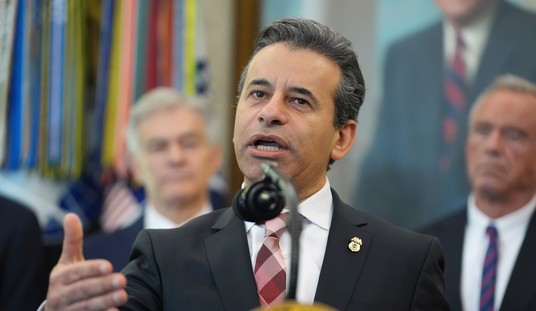WASHINGTON – The U.S. Supreme Court is days away from issuing decisions on two important same-sex marriage cases, which supporters of marriage equality hope will pave the way for a nationwide ruling.
Sen. Kirsten Gillibrand (D-N.Y.) said she was optimistic that the federal Defense of Marriage Act (DOMA) will be repealed by the end of the year.
“I’m actually quite optimistic we can build the support we need over the next several months,” said Gillibrand at a forum hosted Tuesday by Third Way, a professed centrist think-tank in Washington, D.C.
The Supreme Court is weighing two laws on marriage rights – DOMA and California’s ban on same-sex marriage. The first case, United States v. Windsor, challenges the constitutionality of DOMA – a federal law that defines marriage for all federal purposes as a legal union between a man and a woman.
The second case, Hollingsworth v. Perry, brings California’s Proposition 8 – a ballot measure overturning the California Supreme Court’s ruling that determined same-sex couples have a constitutional right to marry – before the Supreme Court.
Legal analysts widely expect the Supreme Court to strike down DOMA, but most likely as a federal overreach rather than as a violation of gay couples’ fundamental rights.
Gillibrand told the audience that she plans to push for a legislative repeal of DOMA regardless of the court’s decision. The court will rule only on Section 3, which bans federal recognition of same-sex marriage, but not section 2, which allows a state to refuse to recognize a same-sex marriage from another state.
She also asserted that any amendments coming out of the U.S. House of Representatives putting same-sex marriage in jeopardy would face stiff opposition.
Speaking about the role of Senate Republicans for the legislation, Gillibrand said the support of Sens. Mark Kirk (Ill.) and Rob Portman (Ohio) has been helpful, and she hopes to recruit Sens. Lisa Murkowski (Alaska) and Susan Collins (Maine), who have come out in the past in support of LGBT rights. Murkowski announced Wednesday morning that she supports legalizing same-sex marriage, becoming the third Republican senator openly endorsing the issue.
“We are very close to the 60 votes we need,” Gillibrand said, “closer than most people think.”
David Boies, co-counsel in the Hollingsworth vs. Perry case, said the Supreme Court could decide in several ways in favor of same-sex marriage supporters in the Proposition 8 trial. The court could affirm the lower-court rulings that held Proposition 8 unconstitutional by focusing on aspects that are peculiar to California.
“The Federal Court of Appeals in California agreed with us that Proposition 8 was unconstitutional, but they did so without reaching the broad equal protection and due process arguments that we made in the district court. What the Ninth Circuit Court of Appeals said is that once you grant rights to people you can’t take those rights away without due process,” Boies said.
Marriage equality became a constitutional right under the California constitution, but Proposition 8 changed that via a referendum to amend the state’s constitution. The result, according to Boies, was that “a right that had been granted was then taken away.” If the court decided in this way, same-sex marriages would be held constitutional only in the state of California.
Boies said the high court could also hold that the people who brought the case to the court do not have standing, which would make same-sex marriage legal in California, but the issue of its constitutionality would be left unaddressed.
“The question is, do those people have a standing to come before the court and defend it? Under Supreme Court precedent, they probably do not have standing,” Boies said. “The court is very restrictive in terms of to whom they grant standing, and they never granted standing to private citizens who do not have a fiduciary relationship to the state.”
Finally, the court could hold that discrimination based on sexual orientation is unconstitutional based on the equal protection or the due process clauses of the U.S. Constitution in a way that legalizes same-sex marriages nationwide.
Gillibrand spoke about the recent wave of state legislatures and members of Congress coming out in support of same-sex marriage and attributed the change in public opinion to a generational shift in which the younger generations have played an important role in changing the view of the older generations on the issue.
The public debate on the issue has reversed course since ballot initiatives on gay-rights issues helped drive conservatives to the polls in 2004, she said. Since then, many states have expanded marriage rights to same-sex couples.
“The American people have already decided, they want full equality in this country. If Congress continues to lead from the past…it will be just another level of discouragement for the American people about the lack of reform happening in [Washington],” Gillibrand said.
Gillibrand, an outspoken advocate for gay rights, played a prominent role in getting “Don’t Ask, Don’t Tell” repealed. She has also pledged her support to Sen. Patrick Leahy’s (D-Vt.) amendment to the Senate’s comprehensive immigration reform bill that would recognize same-sex spouses under immigration laws. Republicans have opposed the provision, in addition to some Democrats who worry that it would sink the overall bill.
Boies, who represented the vice president in Bush v. Gore, said if the ruling fell short of making same-sex marriage a constitutional right, legal action would continue.
“If we don’t win it nationally, there will be additional litigation,” Boies said.









Join the conversation as a VIP Member